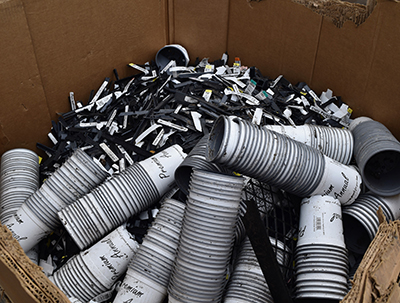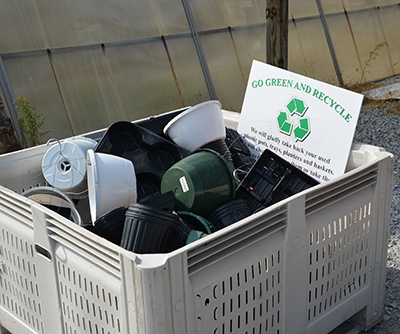Go green: Recycling horticultural plastics
Many horticultural plastics can be recycled with private Michigan companies or a pilot Agricultural Plastic Film Recycling Program in Eaton County.

Greenhouse and nursery production of containerized crops utilizes a lot of plastics in the form of containers flats, carrier trays, greenhouse and nursery tunnel glazing materials, and chemical bottles, just to name a few. As the busy season passes, greenhouse and nursery businesses often are looking for ways to recycle their used agricultural plastics (Photo 1). Some garden retailers also collect used horticultural plastics from consumers to be recycled (Photo 2). Now the question is: where and how can it be recycled?

Photo 1. Plastic horticultural containers selected to be recycled. Photo by W. Garrett Owen, U. of Kentucky Extension.

Photo 2. Garden-retail center accepting used containers from consumers. Photo by W. Garrett Owen, U. of Kentucky Extension.
Michigan State University Extension recommends that agricultural businesses contact plastic companies that accept horticultural plastics for recycling or by scheduling a drop off time of materials at the Sunfield Recycling Facility in Eaton County. The Eaton County location is the first location of the Agricultural Plastic Film Recycling Pilot Program from the Michigan Recycling Coalition.
While a press release in April 2022 from the Michigan Department of Environment, Great Lakes, and Energy (EGLE) reported that recycling has reached an all-time high in Michigan (19.3%), Michigan’s goal is 45%. Horticultural plastics from agricultural producers can continue to be part of the solution to that goal.
Horticultural plastics are classified by their plastic type: High-density polyethylene (HPDE; #2), Low-Density Polyethylene (LPDE; #4), Polypropylene (PP; #5); and High Impact Polystyrene (HIPS; #6). Table 1 describes various horticultural plastics and indicates how to distinguish between recyclable and non-recyclable forms. Table 2 lists examples of plastic companies in Michigan that accept used horticultural plastics for recycling.
Growers should note that not every plastic company accepts every type of horticultural plastic for recycling. Many plastic recyclers require that the material needs to be very clean, sorted, and often baled and forklift-ready. Many of the companies require a minimum weight and/or quantity to justify the costs of labor and transportation to move and process the plastic. Michigan growers should contact plastic companies to discuss the required types, quantities, and logistics of the recycling the plastics.
Table 1. Types of horticultural plastics that can be recycled |
|||
|
Plastic type |
Horticultural plastics |
Common uses |
Can it be recycled? |
|
#2 |
High-Density Polyethylene (HPDE) |
Nursery containers |
Yes, clean containers. |
|
#4 |
Low-Density Polyethylene (LPDE) |
Greenhouse-glazing material, plastic mulches |
Yes, bale plastics for easy handling and transport. |
|
#5 |
Polypropylene (PP) |
Pots |
Yes, relatively, or completely clean. |
|
#6 |
High Impact Polystyrene (HIPS) |
Plug and liner trays, flats, carrier trays |
Yes, clean flats and trays. |
Table 2. Example list of plastic companies that accept horticultural plastics for recycling |
|
|
Bata Plastics |
16980 Wood Rd |
|
Blackmore Company *Note: #6 only |
|
|
6400 M-32 Highway *Note: No #4 greenhouse glazing film |
27620 State Route 7 *Note: #4 or #5 baled including clean greenhouse glazing film |
|
1701 Clyde Park S.W. #15 |
844-490-7873 |
For more information about horticultural plastics and recycling, Michigan State University Extension recommends these two articles:
- Problems with Plastics by Arthur Cameron and Thomas Dudek, Michigan State University
- Horticultural Plastic Recycling – The Future is Brighterby Arthur Cameron, Michigan State University



 Print
Print Email
Email




